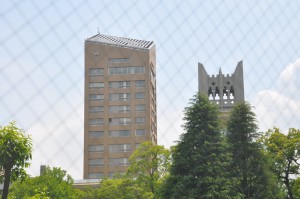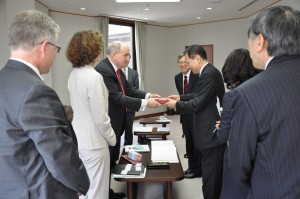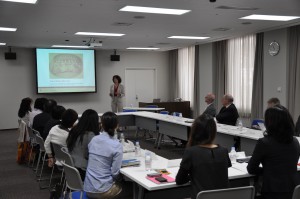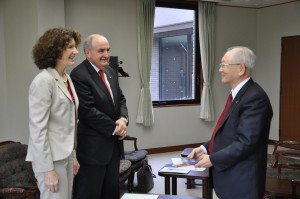A match made in Tokyo
Little would be lost in translation during the IU delegation’s first official order of business on this two-week presidential trip to Asia – a meeting with senior administrators at Waseda University in Tokyo.

The IU delegation explored potential student and faculty exchanges with Waseda University, Japan’s most prestigious private university.
Indeed, a Monday morning conversation, led by IU President Michael A. McRobbie and Waseda President Kaoru Kamata, confirmed what both parties knew well when they inked a university-wide partnership agreement in 2012: There are strong and potentially rewarding connections between Japan’s most prestigious private university and one of America’s most internationally focused institutions of higher learning. What’s more, these connections could serve to stem a decade-long, nationwide trend of fewer U.S. students studying abroad in Japan and rejuvenate IU’s relationships with the country’s premier teaching and research universities.
“We are always looking for prominent universities abroad where we can send our students,” Kamata told McRobbie. “I hope this day becomes a trigger … not only for our university, but for the future of Japan.”
The conversations that continued through lunch and into the early afternoon in Tokyo set the stage for enhanced collaboration between IU and Waseda, which, conveniently, share a mutual mission to expand study abroad opportunities for students and attract increasing numbers of international students. Already, IU ranks among the U.S. leaders in terms of students who study abroad (more than 3,000) and international students (nearly 8,000), but the university is seeking to both expand overseas study opportunities in Japan and attract more Japanese students to IU Bloomington and its other campuses.
Much like IU, Waseda, founded in 1882 by scholar and government leader Shigenobu Okuma, has made exceptional recent progress toward its goal of becoming a truly global university. To this end, Waseda is looking to double its record number of international students (to 8,000) and send more students overseas to schools like IU. (Currently, around 2,000 Waseda students study abroad.)

IU President Michael A. McRobbie, left, presents Waseda University President Kaoru Kamata with a gift.
Additionally, both universities have expressed a keen interest in exploring opportunities for scholarly and research collaboration among faculty. Faculty exchanges between IU and Waseda began last year, and two IU professors, Michiko Suzuki and Michael Foster, who are both members of IU’s departments of East Asian Languages and Cultures and Anthropology, will be in Tokyo later this month. Furthermore, the potential exists for substantive partnerships between IU’s new School of Global and International Studies, which houses IU’s record number (between 70 and 80) of foreign language instruction programs, and several of Waseda’s top schools, including, among others, its now 10-year-old School of International Liberal Studies, Graduate School of International Culture and Communications Studies, and Graduate School of Asia-Pacific Studies.
IU and Waseda share another common mission, one relating to philanthropy and volunteerism, which represented the main themes of a roundtable discussion with the Waseda International Volunteer Center (WAVOC) led by IU First Lady Laurie Burns McRobbie. Founded in 2002, the center works to support educational research and volunteer activities both inside and outside of Japan and make philanthropic contributions through those activities.

IU First Lady Laurie Burns McRobbie leads a philanthropy roundtable with the Waseda International Volunteer Center.
Before an audience that included a number of female Waseda graduate students and the university’s lone female trustee, First Lady McRobbie discussed the history of women’s leadership and philanthropy at IU, her active campus and community involvement as current IU first lady, the emergence of women’s giving at IU and the establishment of two firsts: the Lilly Family School of Philanthropy, the nation’s first school dedicated to the study of philanthropy, and IU’s first Women’s Philanthropy Council, a national model for engaging women in philanthropy and volunteerism in higher education. She also entertained questions on a wide range of topics, including the percentage of female students at IU, the structure of the Women’s Philanthropy Council and other university units, and processes for thanking donors and informing them of the impact of their contributions.
Finally, IU and Waseda have one other interesting fact in common: Both share the exact same number (an amazing 580,000) of living alumni worldwide. Among those Waseda alums is Yasuyuki Ohara, whose name many Hoosiers back home in Indiana may not recognize, but who has had a major impact on the Bloomington community. As chairman and CEO of the Tsuchiya Group, he runs a $1 billion corporation that manufactures, among other products, adhesives, automotive graphics, ceramics, electronics, industrial tapes, plastics and resins. One of the group’s manufacturing and sales companies is Tasus Corp., headquartered in Bloomington since 1986 and home to 180 employees.

IU President Michael McRobbie and First Lady Laurie McRobbie talk with Yasuyuki Ohara, chairman and CEO of the Tsuchiya Group.
During an hour-long meeting with the IU delegation, Ohara, 70, shared some of his personal background and experiences, including his time spent at Waseda, as well as insights into Tsuchiya’s international strategy and successes.
Ohara had a pleasant smile and polite answer to nearly every question asked of him, including the one first and foremost on the minds of members of the IU delegation. When asked why he chose to locate one of the leading companies of his massive overseas network in Bloomington, Ohara didn’t miss a beat. “The educational and cultural opportunities. The green space and the hills. So nice to live in. We searched various places, but Bloomington was one of the best for us.”
Truer words weren’t spoken on a day when many were spoken and many new connections were made.
Tags: East Asian Languages and Cultures, Japan, Kaoru Kamata, Laurie McRobbie, Lilly Family School of Philanthropy, Michael Foster, Michael McRobbie, Michiko Suzuki, School of Global and International Studies, SGIS, Tasus, Tokyo, Tsuchiya Group, Waseda University, Women's Philanthropy Council, Yasuyuki Ohara
 Indiana University
Indiana University

